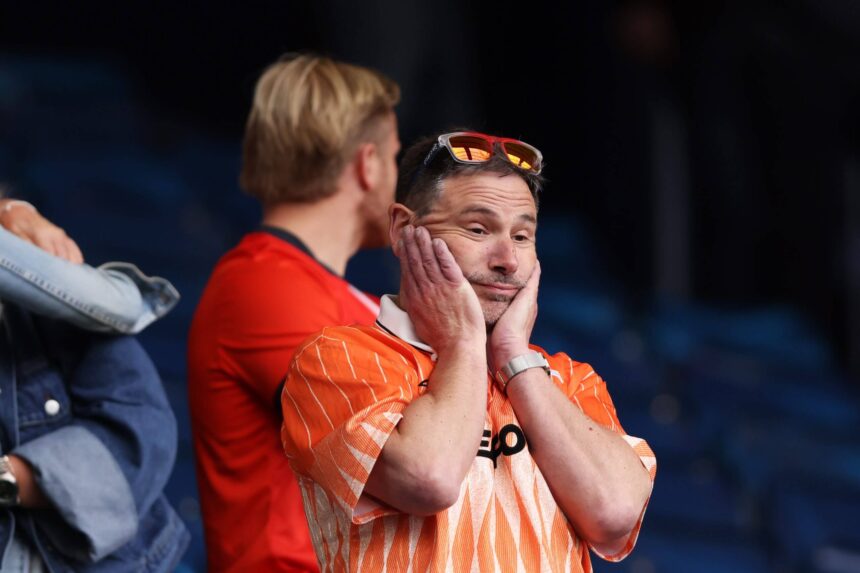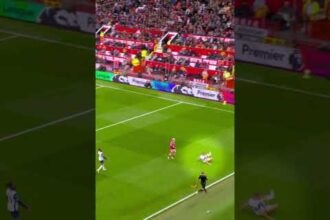Luton Town fans looked dumbfounded.
Their team had just been beaten 5-3 by West Bromwich Albion in a breathless game on the final day of the Championship season to confirm relegation into English football’s third tier. Some hugged loved ones for comfort; others just held their heads in their hands.
Advertisement
It was a dark day in the club’s recent history, and all the more painful given that — just 12 short months ago — Luton still had a chance of staying in the Premier League. They ultimately lost that fight but started this season among the promotion favourites.
Instead, the campaign turned into the mother of all hangovers. Having failed to readjust to the relentlessness of the Championship, they became just the fourth team in Premier League history to suffer successive relegations.
So how did the unthinkable become reality? And is there any way back?
Luton fans look dejected at West Brom (Paul Harding/Getty Images)
The big question back in May 2023 when Rob Edwards’ Luton team defeated Coventry City at Wembley to win the Championship play-off final was: just how did they pull that off?
This, after all, was a club which had fallen out of the Football League entirely in 2009 following a 30-point deduction imposed by the English Football Association due to financial irregularities. A fan-led consortium saved the club from administration but there was no way of preventing Luton dropping into non-League.
It took five years for Luton to win back their League status but once they did, they became turbo-charged, winning four promotions in nine years, culminating in that remarkable win against Coventry with a squad that cost just £11.9million to assemble – a pittance in Premier League terms when you consider during that summer of 2023 a combined £2.36billion ($2.97b) was spent on player recruitment.
Luton were literally not equipped to deal with the Premier League: they had to spend £10m improving their beloved but dilapidated Kenilworth Road stadium, a ground so embedded in the heart of the community that the entrance to one stand is physically connected to a row of terraced houses.
Around £20million was spent in the transfer window — a 20th of the sum laid out by Chelsea that summer — but despite being perhaps the least resourced club to ever play at Premier League level, Luton proved no pushovers.
Advertisement
They drew 1-1 with Liverpool, made Manchester City and Arsenal fight desperately to secure victory and enjoyed notable wins over the likes of Newcastle United and Brighton. Harry Styles, the pop singer, was a visitor in the club’s directors’ box when Manchester United came to visit while Edwards won a legion of admirers, and not just because of his charming press conference manner which earned him the nickname ‘Handsome Rob Edwards’.
It wasn’t enough, with relegation mathematically confirmed on the final day of the season when Nottingham Forest, a team now battling for European football at the opposite end of the table, won to finish six points above them. But hopes were still high for the new season and their chances of making an instant return.
In truth, however, Luton never readjusted to the gruelling treadmill of the Championship, which is far removed from Premier League glamour. A brutal schedule of 46 league games (Premier League campaigns are 38) took its toll on a squad whose morale had been bruised by relegation.
“The Premier League is so far clear of anything else that it’s quite a fall to go from there to the Championship,” Kevin Harper of Luton Town’s Supporters Trust says. “I just don’t think we were ready to handle it.”
There were practical problems, too. One of the standout players in Luton’s top-flight campaign was former England midfielder Ross Barkley. His departure on a free transfer to Aston Villa, together with losing the technical ability of Arsenal loanee Albert Sambi Lokonga and the pace of Republic of Ireland winger Chiedozie Ogbene, who signed for Ipswich Town (who took Luton’s place in the Premier League), were blows that could not be sustained.
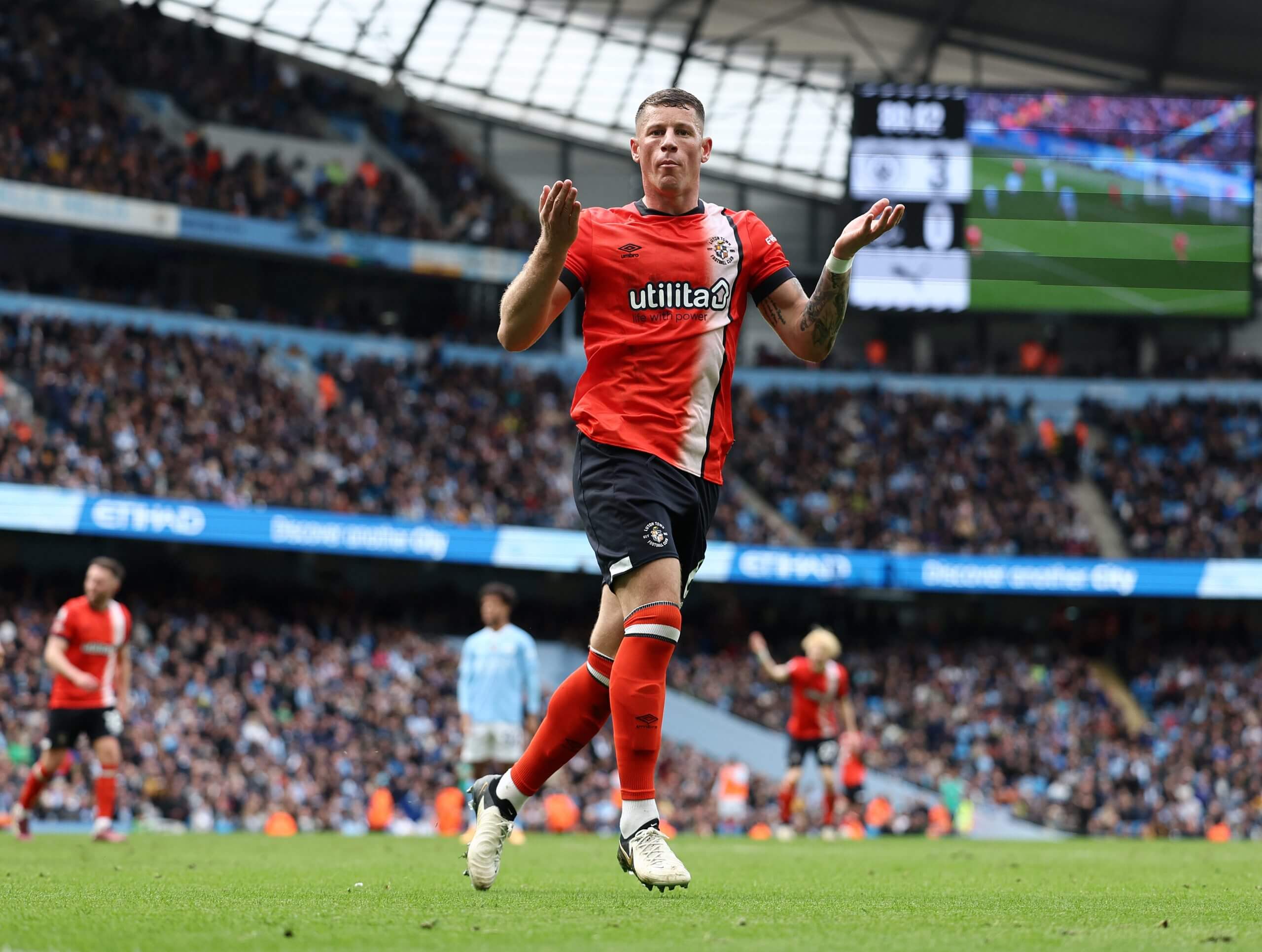
Ross Barkley was key for Luton last season (Matt McNulty/Getty Images)
“Ross was just impossible to replace,” Gary Sweet, Luton’s chief executive, tells The Athletic. “Ross is a Premier League player and what you can’t do is to even think about replacing Ross Barkley in the Championship. Ross Barkleys don’t exist in the Championship.”
While departures hurt Luton, new arrivals left many fans feeling underwhelmed. There were 15 new arrivals in total but only £26m was spent, despite having had a season of Premier League riches and having received the first of two parachute payments in the region of £50million. Splashing the cash is not their style.
Advertisement
“The backdrop of our custodianship of the football club is financial stability,” Sweet says. “It’s an absolute cornerstone and that is vital to Luton Town because whilst the new generation of Luton fans won’t have the memory of what happened prior to our ownership, we went through three administrations in a fairly short period at a time. The club was unstable, it’s more stable now than it probably ever has been financially and structurally. We want to keep that intact.”
Few would argue that is a sensible policy, particularly given Luton’s previous flirtations with financial disaster, but it meant that Edwards was not equipped with a squad that could mount a realistic promotion challenge. Three defeats in their first four games set the tone.
“On the opening day they lost 4-1 to Burnley and that showed them they hadn’t really strengthened as they wanted over the summer,” Mike Simmonds, Luton correspondent for Luton News, explains. “They got off to a bad start and then they just couldn’t get going after that really. They kept conceding goals, kept losing to teams they shouldn’t lose to.”
For Edwards, it proved a season too far.
In early November, Luton travelled to Middlesbrough and lost 5-1. A crestfallen Edwards conceded it was not good enough and that the decision on his future was “out of my hands”. Most expected him to depart soon; instead, he stayed until January, suffering seven more defeats, until he was sacked and replaced by Matt Bloomfield.
“It was heart-wrenching,” Sweet says. “We loved Rob for what he delivered for this football club and we wanted to keep him here for a long time. We gave him a new four-year deal last summer, he deserved that.
“Of course we could have done it sooner, we could’ve done it any time. There’s nothing commercial, financial or anything that dictated it. What dictated it was the human element to this and that Rob was an employee of ours that we cared passionately about. We weren’t going to disrespect that. Our view is that instability in football management is a bad thing for football clubs. We try to recruit the right manager and keep them here for the long term.”
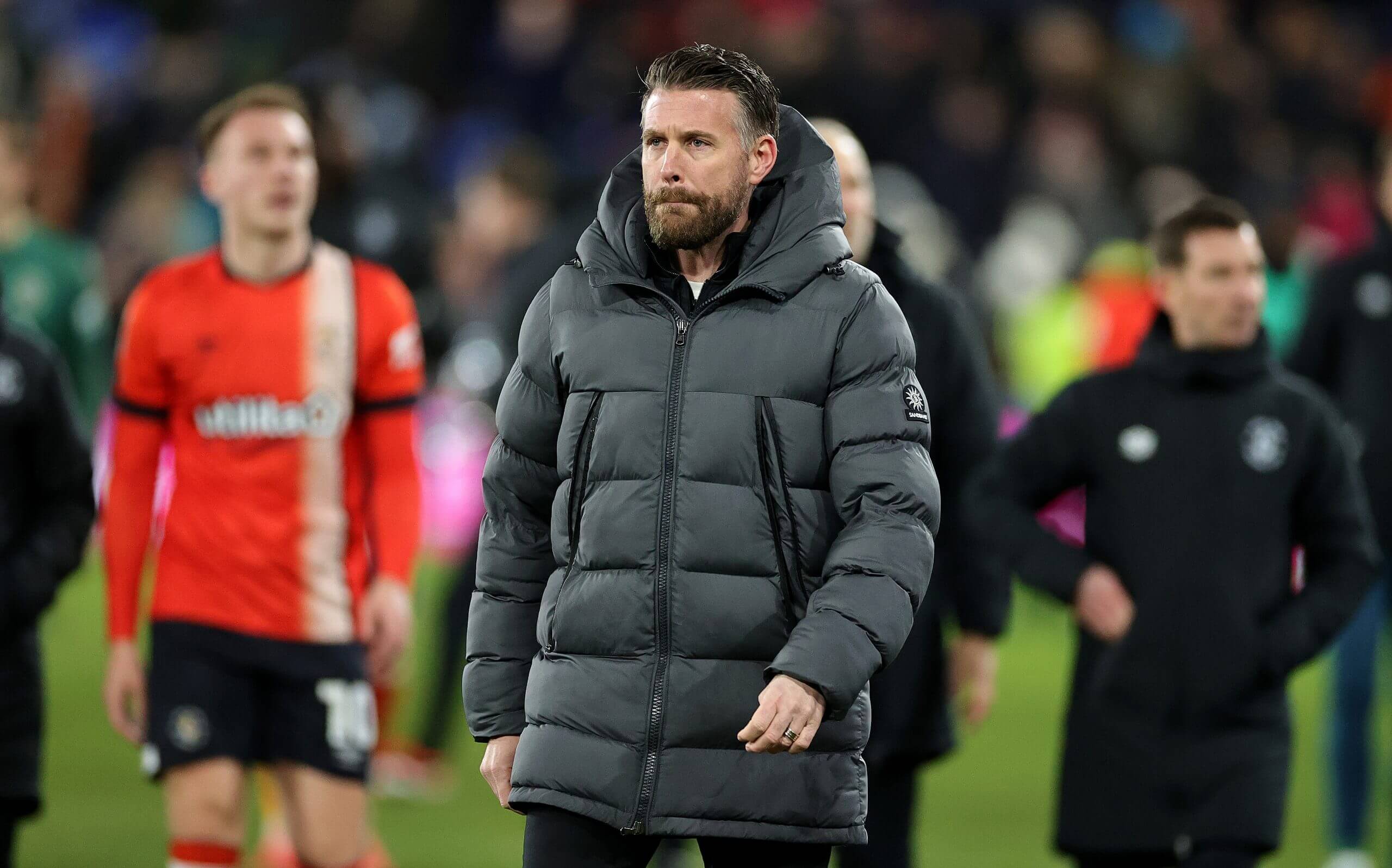
Rob Edwards left Luton in January (David Rogers/Getty Images)
Maybe Edwards himself would recognise that it would have been better to walk away last summer. Last season was exhausting, not just in terms of the club’s relegation battle but also the trauma of seeing club captain Tom Lockyer, who had been taken to hospital after collapsing at the play-off final, fall to the ground again, this time at Bournemouth’s Vitality Stadium, in December 2023. The Wales defender’s heart stopped for two minutes and 40 seconds until medical staff and paramedics were able to revive him following cardiac arrest.
Lockyer had been passed fit to play following his cardiac issues but has not played all season after suffering ankle injuries and many feel Lockyer’s leadership on the pitch has been sorely missed. He is out of contract this summer and recently admitted he did not know where his future lies.
Bloomfield made Luton more difficult to break down. They picked up 24 points in the last 20 games, including a 1-1 draw with Championship winners Leeds United, and climbed out of the relegation places last week following a win over play-off-chasing Coventry.
Another win at West Brom would have been enough to secure safety but, instead, a capitulation left the club facing what Bloomfield called the “agonising” reality of relegation.
Advertisement
Now Luton have to go again in League One, although at least they have been prepared for that eventuality.
“Last year was our first relegation since 2008-09 and for a club that is renowned for a rollercoaster ride, that’s some going,” Sweet says. “We’ve had four promotions since then. We know how to handle the transition going upwards, but that first summer last year was the first time we’ve had to manage it going the other way. We have learnt an awful lot from that.
“There is a plan we’ve got for League One that will be fully active from Sunday onwards. Any club that is in this position that doesn’t do that (plan for both outcomes) is just burying their head in the sand.”
Key to Luton’s future is their long-mooted new stadium project and the surplus earnings from the 2023-24 season has helped them plan for a 25,000 capacity stadium, an increase from the original plan of 18,000.
“That is what the Premier League has done for us,” Sweet adds. “What I’ve been saying this week when we’ve announced the contractor to build Power Court (the location of the new ground) is that during the course of this lifetime we’re going to be playing football in that stadium in the Premier League, the Championship, in League One and, most probably, League Two because that’s Luton Town.
“That’s who we are, they are the journeys we take, as our history has absolutely proven. So whether we are League One or Championship next season, it makes really no difference to the specification of that programme, the timeline or delivery of Power Court. All we do is regroup as a football club and a football team.”
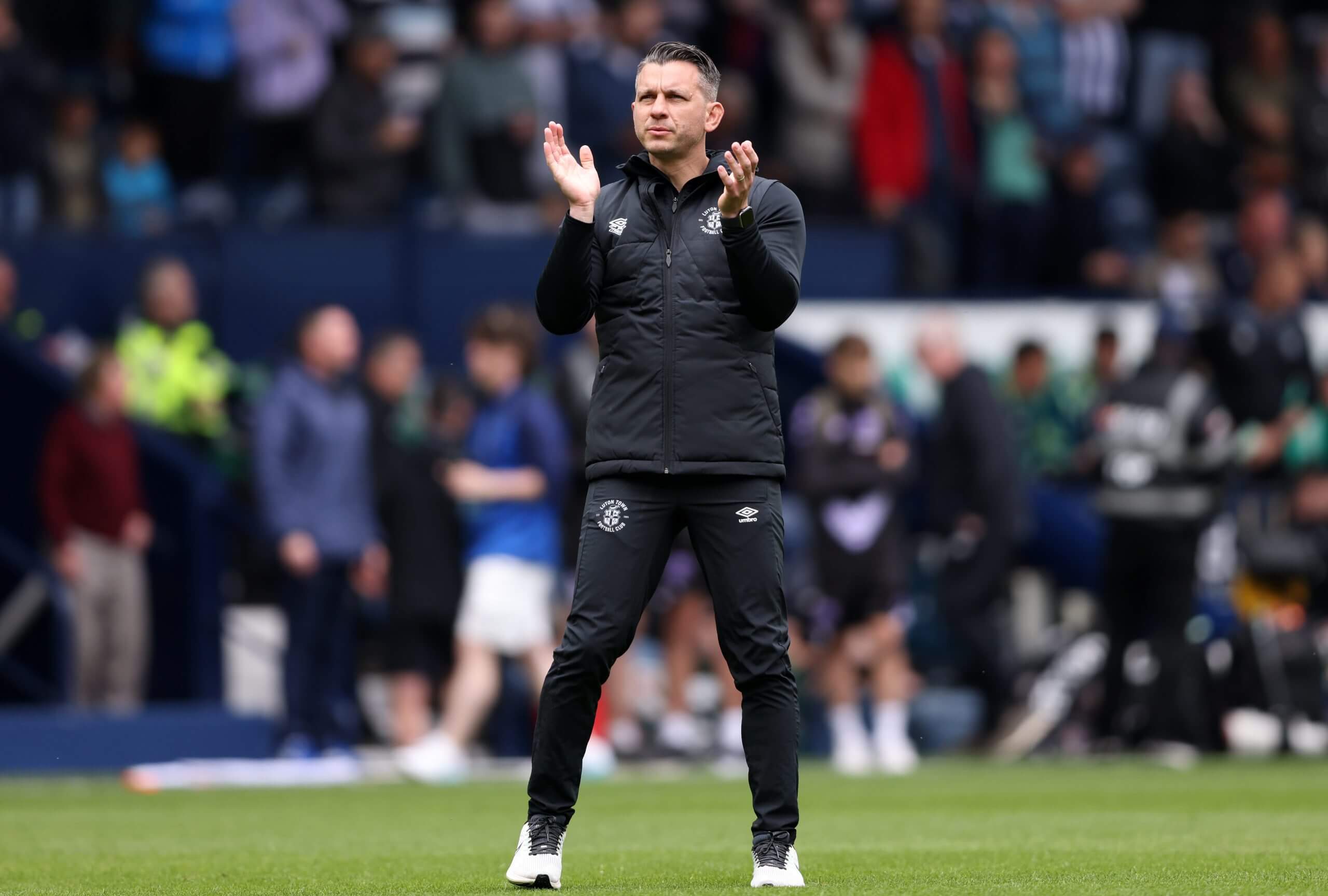
Matt Bloomfield engineered a recovery at Luton Town but it was too late (Paul Harding/Getty Images)
For fans who have experienced some crushing lows, League One does not represent the catastrophe it might for others.
Matt Claridge was born blind and has been attending Luton games his whole life. His now-retired guide dog Jeffrey, who attended games with him, became an online sensation and was one of the stars of Luton’s Premier League adventure.
Advertisement
“A month ago, people thought we were down,” says Claridge, who listened to the West Brom game at home with Jeffrey and his new guide dog Primrose. “We were bottom of the table with 12 games left. But we turned it around and no one thought we would go into the last game of the season fighting to stay up. A lot of us thought we would already be down.
“I don’t see what’s happening on the pitch but I can tell the people around us have been more hopeful. And even if we do go down, we’ll still be there for them. I was there supporting them in the Conference (National League) so we’ll still be supporting them every week. That will never change.”
(Top photo: Paul Harding/Getty Images)


